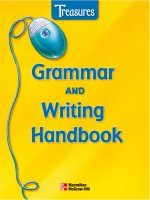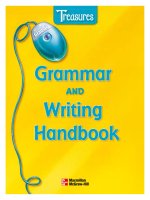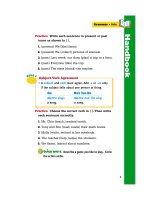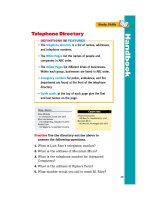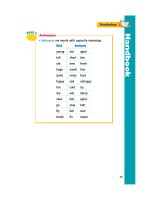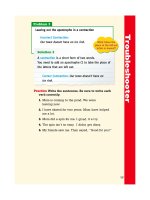grammar and writing handbook grade 3
Bạn đang xem bản rút gọn của tài liệu. Xem và tải ngay bản đầy đủ của tài liệu tại đây (5.73 MB, 157 trang )
GRADE 3
Grammar and
Writing Handbook
ISBN: 0–328–07539–6
Copyright © 2004, Pearson Education, Inc.
All Rights Reserved. Printed in the United States of America.
This publication is protected by Copyright, and permission should be obtained
from the publisher prior to any prohibited reproduction, storage in a retrieval system,
or transmission in any form by any means, electronic, mechanical, photocopying,
recording, or likewise. For information regarding permission(s), write to: Permissions
Department, Scott Foresman, 1900 East Lake Avenue, Glenview, Illinois 60025.
1 2345678910 V000 09 08 07 06 05 04
scottforesman.com
Editorial Offices: Glenview, Illinois • Parsippany, New Jersey • New York, New York
Sales Offices: Parsippany, New Jersey • Duluth, Georgia • Glenview, Illinois
Coppell, Texas • Ontario, California • Mesa, Arizona
5
5
Writer ’s Guide
Writer ’s Guide
Ideas and Content
Before you write, you need to have a main idea and a reason,
or purpose, for writing. The main idea is the most important
point you want to make. Your purpose may be to persuade, to
inform, to describe, or just to entertain your readers.
A note to a friend has a main idea and a purpose.
Main Idea Convince a friend to
see your new kitten
Purpose To persuade someone
Details Lively and interesting words,
such as fluffy, purr, and leap, make
word pictures for your reader. Details
give important information.
The birds are eating. (no details)
The gray pigeons peck at the dry bread.
(details to show what is happening)
Strategies for Choosing a Main
Idea and Purpose
• Choose something you know well or would like to learn about.
Your topic could be your favorite aunt or the planets.
• Think about your purpose for writing. An adventure story
would entertain. A how-to report would inform readers.
WRITER’S GUIDE
WRITER’S GUIDE
6
Writing Ideas and Content
FOCUS
Stay on your topic and
use only details that are
about your main idea.
Jorge,
Come to my house
tomorrow to see my new,
fluffy kitten. She loves
to purr and leap.
Avi
Writing Ideas and Content
7
WRITER’S GUIDE
WRITER’S GUIDE
Match the number of each sentence with the purpose that
it fits best.
A Inform B Persuade C Describe D Entertain
1. Green plants help clean the air we breathe.
2. Let me tell you a funny story about my dad.
3. Doctor Jackson is tall and thin and has bright red hair.
4. Our school really needs a new gym.
Some sentences below do not stay on the topic of the circus.
Write the letters of those sentences.
A The wrinkly elephants swayed to the loud music.
B My new sandals were very comfortable.
C Three white poodles pranced around the ring.
D A jolly clown with fuzzy, orange hair juggled balls.
E Loreen and her mom went to the beach last week.
F The fierce lions leaped through fiery hoops.
Choose one of the main-idea sentences
below. Then write three sentences about
the topic. Remember to use clear details.
• My best friend is an interesting person.
• I had an exciting adventure last month.
• Girls and boys can be good friends.
C
B
A
Organization
A careful writer tells about events and details in order. Your
organization builds a frame to hold your writing. The
frame keeps your ideas in place.
Here are some ways to organize your writing.
• a story with a beginning, middle, and end
• a comparison-contrast
• a description from top to bottom
• a how-to explanation
Before you write your first word, think about how you will build
your writing. For example, if you want to tell what happened at
a school meeting, you would write a report. If you want to explain
how to ride a scooter, you would write a how-to explanation.
Once you decide on your frame, choose the details you want
to include. You will also have to think about how to arrange your
details from beginning to end.
Strategies for Organizing Ideas
• Begin with the most important detail
or save it for last.
• Use order words such as first, later, and last.
• Put details that are alike in the same
paragraph.
WRITER’S GUIDE
WRITER’S GUIDE
8
Writing Organization
GRAPHIC ORGANIZER
A graphic organizer
such as a chart, story
map, or web can help
you organize your
ideas.
Writing Organization
9
WRITER’S GUIDE
WRITER’S GUIDE
Match the number of the topic with the letter of the kind
of organization that works best.
1. Our green parakeet, Snuffles A Comparison-contrast
2. How to make apple muffins B Story
3. Car or train: which is better? C Description
4. What happened on my vacation D How-to explanation
Choose a detail from the box to complete each sentence.
Write the paragraph.
Marie’s First Try
5. My cousin Marie bought her _____ last
Monday. 6. The next day, she went to the _____.
7. As she stepped onto the ice, Marie _____.
8. She wasn’t hurt, but she _____. 9. We skated
over to her and _____.
Think of a time when you learned something new.
Tell how you learned each step. Use order words
such as first, then, and next to organize the details.
C
parrot first pair of skates new sweater
skating rink read a book library
slipped and fell helped her up started to cry
B
A
Voice
Your writing shows your special style and personality.
Use your writer’s voice to shape your writing. A
writer’s voice may be funny or serious. It could be
friendly or formal. When your writing voice is strong
and clear, readers believe what you have to say.
• I was so tired that I got into bed early. (weak voice)
• I was so worn out that I crawled into bed an hour before
dinnertime. I didn’t wake up until Dad shouted that
breakfast was ready. (strong voice)
Strategies for Developing a Writer’s Voice
• Think about your readers and about your
reason for writing. Use a light, friendly voice
when you write a letter to a cousin or when
you tell a funny story. Use a more serious
voice for a book report or for directions.
• Your choice of words should match your
voice. In informal writing, you might use
contractions or slang to make your writing
sound like your everyday voice. A letter to the editor
of your school newspaper would have a more serious voice.
• Use your writer’s voice to speak directly to your audience.
If your voice is strong, readers want to keep on reading.
WRITER’S GUIDE
WRITER’S GUIDE
10
Writing Voice
VOICE
Try reading your
work aloud to see
if your writing
sounds like you.
If it doesn’t, think
about what might
be missing from it.
Writing Voice
11
WRITER’S GUIDE
WRITER’S GUIDE
Match each opening sentence with the letter of the reader
it fits best.
A Aunt Kira in Texas C The school principal
B The head zookeeper D A group of classmates
1. We would like another microscope for the science room.
2. Thanks for that great new game you sent me.
3. May we please have a special tour of the jungle exhibit?
4. Let’s throw a party for Miss Peters!
Read each sentence. Write E if you would use an everyday voice
in your writing. Write S if you would use a serious voice.
5. You are writing to the editor of the local newspaper.
6. You are writing a note to your best friend.
7. You are writing an e-mail message to your cousin.
8. You are writing a report about sea turtles.
Choose one of the following opening sentences.
Add sentences to write a paragraph about
the topic. Use a voice that fits the main
idea and the audience.
• Would you like to make a bowl of cereal?
• Dear Editor, The schoolyard needs some new paint.
• Spring and fall are my favorite seasons, but for
different reasons.
C
B
A
Word Choice
Words are the writer’s handiest tool. Build your writing with
exact nouns, strong verbs, and vivid adjectives. Your style will
be interesting and lively.
• I like the bakery because it smells good. (dull and plain)
• The bakery smells like sweet cinnamon rolls and fresh,
crusty bread. (lively and detailed)
Strategies for Choosing the Right Words
• Choose exact nouns. (spaniel instead of dog,
broccoli instead of vegetable)
• Use strong verbs. (shatter instead of break,
shriek instead of yell)
• Replace dull words such as nice, bad, and
thing with clear words. (“The owner was
greedy and cruel” instead of “The owner
was bad.”)
• Include words that use our senses. (“The sun was
as warm as a blanket” instead of “The sun was warm.”)
• Don’t be wordy. (suddenly instead
of “with great suddenness”)
• Include specific details. (“Dan slurped
up soup and ate crackers” instead of
“Dan was a noisy eater.”)
WRITER’S GUIDE
WRITER’S GUIDE
12
Writing Word Choice
WORDS WITH PEP
When you want
to spice up your
writing, think
about exciting
words such as
sparkle, zoom,
velvety, and lumpy.
Writing Word Choice
13
WRITER’S GUIDE
WRITER’S GUIDE
Replace the underlined words with more exact words from
the box. Write the paragraph.
1. The cook makes
the spicy soup. 2. The kitchen smells
like food
. 3. She puts her finger into the pot for a taste.
4. The soup is hot.
5. The cook smiles and nods. 6. Her meals
are always good.
Change each underlined word to a more vivid word of your
own. Write the sentences.
7. Jeff and Pooch went
through the park.
8. It was a nice
autumn day.
9. Then Pooch saw something in the grass.
10. He went
across the park.
11. The little squirrel was fast.
12. It went
up a tree.
13. Pooch looked
sadly at the tree.
14. The squirrel had gone!
Write a description of an animal you have seen.
Use strong, vivid words to make your writing come alive.
C
B
delicious stirs onions and garlic
dips beams bubbles and steams
A
Sentences
Good writing has a natural flow. Different kinds of sentences
should make it sound smooth and clear. When you hear a story
read aloud, listen to the style and the rhythm of the sentences.
Here are some ways to improve your sentences.
• Use different kinds of sentences. Questions, commands,
and exclamations add style to your writing.
• Make sure your sentences are not all short and choppy.
Sometimes a longer sentence helps the writing flow.
• Use different beginnings. Starting too many sentences
with I, she, the, or a can be boring.
• Use connecting words. Words such as even though,
because, while, and so can join sentences to make
them more interesting to read.
Strategy for Improving Your Sentences
Read a piece of your writing. Each time you start a sentence with
I, she, the, or a, circle the word. Underline all the short, choppy
sentences. See how many different kinds of sentences you use.
Write this information on scratch paper. Then see which
things you can change to make the writing better. Have you used
too many statements instead of other kinds of sentences? Are
most of your sentences short and choppy? Keep this information
in a writing folder to help you improve your writing.
WRITER’S GUIDE
WRITER’S GUIDE
14
Writing Sentences
Writing Sentences
15
WRITER’S GUIDE
WRITER’S GUIDE
Use the connecting words in ( ) to join the two sentences.
Write the sentences.
1. We went to the seashore. We could splash in the waves. (so)
2. Hal loves the winter. Our state has tons of snow.
(even though)
3. Our kitten meowed loudly.
I got her food ready. (while)
4. The dog needed a bath.
He had rolled in the mud.
(because)
Rearrange the words in sentences 6.–9. so that I is not
the first word. Start with the underlined phrase.
Example: I jumped out of bed this mor
ning.
Answer: This morning I jumped out of bed.
5. I could not find one brown sock. 6. I searched
everywhere befor
e breakfast. 7. I caught the school bus just
in time. 8. I opened my lunchbox at noon. 9. I found the
sock on top of my sandwich!
Write a short story about finding something that you thought
you had lost. Use different kinds of sentences. Be sure to start
your sentences with different words.
C
B
A
Conventions
Conventions are rules for writing. Capital letters show where
a sentence begins. A period, question mark, or exclamation mark
signals the end of a sentence. A new paragraph begins with an
indentation. Grammar and spelling follow patterns.
• joe asted his techur for a pensul then he could gets to work.
(weak conventions)
• Joe asked his teacher for a pencil. Then he could get to work.
(strong conventions)
Strategies for Conventions of Writing
• Start sentences with a capital letter
and end with a punctuation mark.
• Make sure each sentence tells a complete
idea. Each subject and verb should agree.
• Don’t change verb tenses without
a good reason.
• Be sure special names are capitalized
correctly.
• Check for correct punctuation.
Follow rules for commas, apostrophes,
and other punctuation marks.
• Use a dictionary or spell-checker
for difficult words.
WRITER’S GUIDE
WRITER’S GUIDE
16
Writing Conventions
PROOFREADING MARKS
New paragraph
Capital letter
Lowercase
letter
Correct
the spelling.
Add something.
Remove
something.
Writing Conventions
17
WRITER’S GUIDE
WRITER’S GUIDE
Choose the correct word in ( ) to complete each sentence.
Write the sentences.
1. Winter (is, are) my favorite time of year.
2. My family and (us, I) love to sled and throw snowballs.
3. We certainly (enjoy, enjoying) the cold.
4. I have (took, taken) my friends skiing too.
5. They all (likes, like) winter sports a lot.
Look at each sentence. Correct any mistakes in punctuation,
grammar, and spelling. Write the paragraph.
6. The united states is a large country. 7. Have you
seen our land from coast to coast. 8. Mountains and valleys
is in almost every state. 9. Swimers and boaters enjoy the lakes
and rivers. 10. try to see some part of our wonderful country
on your next vacation.
Write three sentences about one of the
topics below. Remember to follow the rules
for capitalization, punctuation, grammar,
and spelling. Trade papers with a classmate
and look for anything that should be changed.
• A sport I would like to learn
• A trip I would like to take
• A job that seems interesting
C
B
A
PROOFREADING
When you proof-
read, look carefully
for mistakes. Use a
ruler to check each
line from start to
finish. Read aloud
to catch errors.
Using a Scoring Rubric
What makes a piece of writing excellent? When is writing good,
or not good? One way to judge a piece of writing is to use a scoring
rubric. A rubric is a checklist of qualities, or things to look for.
See pages 6–17 for a discussion of these qualities.
Rubrics give a number score for each thing you are looking for.
You can use a rubric such as the one below to judge your writing.
WRITER’S GUIDE
WRITER’S GUIDE
18
Using a Scoring Rubric
WORD
SCORE IDEAS/CONTENT ORGANIZATION VOICE CHOICE SENTENCES CONVENTIONS
4
Clear, focused, Smooth flow Honest, Precise, Smooth, Excellent
well-supported of ideas from engaging, interesting, varied, and control with
ideas beginning to lively and accurate rhythmic only minor
end, with writing words sentences errors
connecting
words
3
Ideas usually Information At times Correct and Generally Good control;
focused and given in reveals adequate smooth, no serious
supported some order writer’s words varied errors prevent
personality sentences understanding
2
Ideas sometimes Little direction Fails to Limited Awkward Weak control
unfocused and from beginning engage vocabulary; or wordy with errors
undeveloped to end audience lacks sentences that make
or show freshness with little writing hard
emotion variety to read
1
Ideas confusing Ideas hard to Flat writing Incorrect, Choppy Many errors
and unsupported follow with no with no dull, or sentences; that prevent
direction feeling overused run-ons understanding
words or fragments;
and overused
as connector
Writing Models
19
WRITER’S GUIDE
WRITER’S GUIDE
Score 4
Ideas/Content Focused and supported by many details
Organization Order words then, next, and finally move
story along; has a clear ending
Voice Strongly engages readers (“Even the dog was droopy!”)
Word Choice Vivid word choice and images (twisty, fancy tray)
Sentences Clear, smooth sentences
Conventions Few mistakes; a misspelling (stomack)
One day I got the flu. I was sick to my stomack
and felt really dizzy. Then my dad said to lie down.
Next, he brought me ginger ale with a twisty straw.
Finally, my stomack stopped aching. My parents and
my brother had helped me feel better.
Then everybody else got sick! Even the dog was
droopy! I carried up ginger ale on a fancy tray. I
hope we never get sick like this again.
Following are four responses to a prompt. Read each response
and the notes below it. This will show how each piece got its score.
Writing Prompt: Write about a time when someone
helped you feel better or you helped someone else feel better.
WRITER’S GUIDE
WRITER’S GUIDE
20
Writing Models
Score 3
Ideas/Content Focused on the idea of making someone
feel better and supported with details (blue bags, piece of
cake, little card)
Organization Story has a beginning, middle, and end;
order words to make order of events clear
Voice Expresses feelings (“that made me feel good”)
Word Choice Good use of verbs (raked, sawed); exact
nouns (leaves, branches)
Sentences Varied and smooth sentences
Conventions Some mistakes; some spelling errors
(naybor, leening, passd); a capitalization error (“that made
me feel good.”)
One day I helped my next-door naybor clean up
his backyard. We raked and put leaves in blue bags
to recycle them. Then we sawed some branches off
the tree that was leening against his house. My help
made him feel better because his wife just passd
away. The next day I went back to bring him a piece
of cake and a little card I made. He said, “Matthew,
you are like a grandkid.” that made me feel good.
Writing Models
21
WRITER’S GUIDE
WRITER’S GUIDE
Someone made me feel better when I busted my
head. And my mom made me feel better. They took me
to the hospitil. And they bought me a toy and it made
me feel better. And the next day they brought me more
stuff and they bought me moovies and games. And then
at 8:00 I fell asleep. And in the morning I feel a little
better. I’m never going to do that again.
Score 2
Ideas/Content Focused on the idea of someone
who is helped to feel better, but needs more details
Organization Moves from a beginning to an end
Voice Gives reader a sense of who the writer is
Word Choice Many dull or repeated words
(took, stuff, feel)
Sentences Opening not very clear; too
many choppy sentences; most sentences
begin with And
Conventions Misspellings (hospitil, moovies);
change in verb tense (“I feel a little better”);
grammar error (busted)
WRITER’S GUIDE
WRITER’S GUIDE
22
Writing Models
My mom halp me when I am skare. She trn on the
Light so I whent Be skare all night.
Score 1
Ideas/Content Main idea not supported by details
Organization Time order not clear
Voice Writer not involved
Word Choice Dull word choice
Sentences Sentences difficult to understand
Conventions Incorrect
capitalization (Light, Be);
misspellings (halp, skare, trn, whent);
incorrect use of verb tense and
form (halp, trn)
23
Grammar and
Writing Lessons
Grammar and
Writing Lessons
UNIT 1 GRAMMAR
24
Grammar How I Spent My Summer Vacation
Sentences
A sentence is a group of words that tells a complete thought.
A group of words that does not tell a complete thought is called
a fragment. In a sentence, the words are in an order that
makes sense. All sentences begin with a capital letter and end
with a punctuation mark.
Sentence: I enjoy vacations with my family.
Not a sentence: Enjoy vacations with my family.
Read each group of words. Write the one in each pair
that is a sentence.
1. Do you like to be outdoors during warm weather?
No coats or scarves.
2. Wearing shorts and T-shirts.
Summer is great for hiking and swimming.
3. We plan to climb a mountain on this trip.
Plenty of exercise!
4. It is almost three thousand miles from my home.
Will have an exciting trip.
Read this story. Write the three complete sentences.
5. The mountain rises high in the sky. 6. Older than the
forest. 7. Few people have climbed to the top. 8. Snow never
melts at the top of the mountain. 9. Stories about climbers.
A
UNIT 1 GRAMMAR
Grammar How I Spent My Summer Vacation
25
Read each group of words. Write S if the group of words is
a sentence. Write NS if the group of words is not a sentence.
1. My sister wanted to go to the beach.
2. Had been to the beach many times.
3. Dad solved the problem for us.
4. We could see mountains and the Pacific Ocean.
5. Everybody in the family!
6. Packed for the trip last night.
7. I traveled by airplane for the first time.
8. Had a book about Washington State.
9. Can’t wait.
10. This will be the best vacation ever!
Add your own words to make complete sentences.
Write the new sentences. Remember to use capital letters
and punctuation marks.
11. _____ go to the beach
12. My friends and I _____
13. _____ jumped into the icy water
14. We _____
15. _____ rest in the warm sunlight
16. After my rest, I _____
17. _____ look for seashells
18. _____ love the sound of the water
19. My family _____
C
B
Review and Assess
Read each group of words. Write S if it is a sentence.
Write NS if it is not a sentence.
1. You can take a vacation right where you live.
2. Pretend that you have never seen this place.
3. For a walk around your town.
4. May see your town in a new way.
5. List of questions and find out the answers.
6. The library is a good place to start.
Write the letter of the word or group of
words that will complete each sentence.
7. Each August, my family _____.
A visits friends in Maine C our friends in Maine
B a visit to Maine D friends in Maine
8. _____ hike in the country.
A Taking C We
B Train D Buys
9. _____ feels cool and fresh in Maine.
A Breezy C Very
B Always D The breeze
10. My friend Annie and I _____.
A blueberry pies C blueberries
B pick blueberries D delicious
UNIT 1 GRAMMAR
26
Grammar How I Spent My Summer Vacation
Telling About You in Personal Narratives
A personal narrative shares something important or exciting
that happened to you. Your narrative should include sentences
that tell the reader how you felt, acted, and looked at the time.
Complete the sentences below with details from the list.
girl in green goggles waved at me
was splashing in the waves shy and embarrassed
my sister’s baggy swimsuit comfortable all at once
1. One day, I _____.
2. Up from the water popped a _____.
3. Oh, no, I was wearing _____!
4. My red face showed I was _____.
5. Suddenly, the girl smiled and _____.
6. Then I felt _____.
Create a word picture of yourself by completing these
sentences. Write the new paragraph.
7. My hair is like a _____. 8. _____ make me laugh.
9. My favorite time of year is _____. 10. I like people who
_____. 11. I am really good at _____. 12. My friends say
that I _____. 13. After school, I like to _____.
Write a personal narrative about a day when you met a new
friend. Give details about how you felt, acted, and looked.
C
B
A
UNIT 1 FOCUS ON WRITING A PERSONAL NARRATIVE
Writing a Personal Narrative How I Spent . . .
27
Subjects and Predicates
The subject is the part of the sentence that tells whom or what
the sentence is about. All the words in the subject are called
the complete subject.
Complete Subject
The excited girl picked beautiful flowers.
The predicate is the part of the sentence that tells something
about the subject. All the words in the predicate are called
the complete predicate.
Complete Predicate
The excited girl picked beautiful flowers.
Write the sentences. Circle each complete subject.
1. Lonely Cinderella visits the three pigs.
2. They bake oatmeal cookies.
3. The hungry girl eats all the cookies.
4. The smallest pig makes some more cookies.
Write the sentences. Underline each complete predicate.
5. Silly Pinocchio plays in the forest.
6. A thunderstorm scares him.
7. The little boy runs into a nearby house.
8. Sleepy Goldilocks naps in the smallest bed.
A
UNIT 1 GRAMMAR
28
Grammar Goldilocks and the Three Bears
